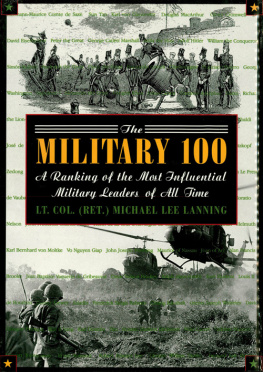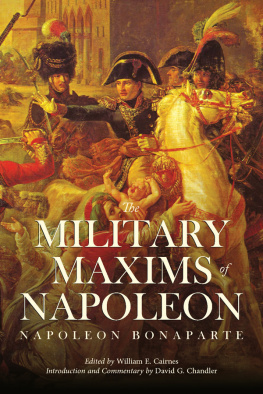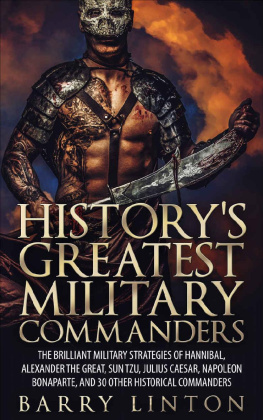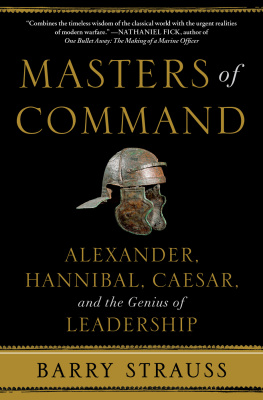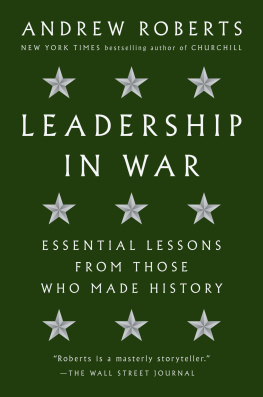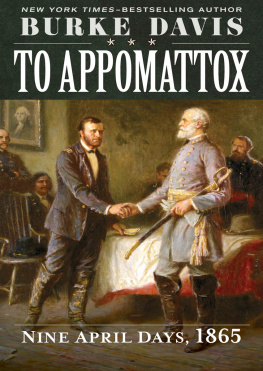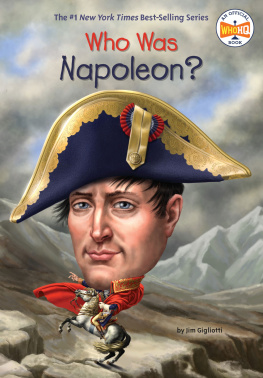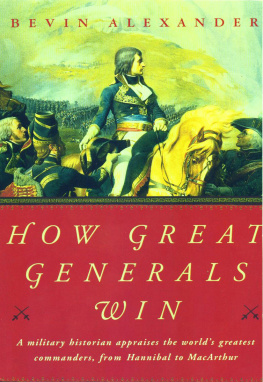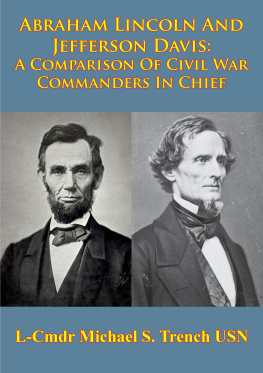MASTERS
OF THE
BATTLEFIELD

MASTERS
OF THE
BATTLEFIELD

GREAT COMMANDERS
FROM THE CLASSICAL
AGE TO THE
NAPOLEONIC ERA
PAUL K. DAVIS


Oxford University Press is a department of the University of Oxford.
It furthers the Universitys objective of excellence in research,
scholarship, and education by publishing worldwide.
Oxford New York
Auckland Cape Town Dar es Salaam Hong Kong Karachi
Kuala Lumpur Madrid Melbourne Mexico City Nairobi
New Delhi Shanghai Taipei Toronto
With offices in
Argentina Austria Brazil Chile Czech Republic France Greece
Guatemala Hungary Italy Japan Poland Portugal Singapore
South Korea Switzerland Thailand Turkey Ukraine Vietnam
Oxford is a registered trade mark of Oxford University Press
in the UK and certain other countries.
Published in the United States of America by
Oxford University Press
198 Madison Avenue, New York, NY 10016
Paul K. Davis 2013
All rights reserved. No part of this publication may be reproduced, stored in a retrieval system, or transmitted, in any form or by any means, without the prior permission in writing of Oxford University Press, or as expressly permitted by law, by license, or under terms agreed with the appropriate reproduction rights organization.
Inquiries concerning reproduction outside the scope of the above should be sent to the
Rights Department, Oxford University Press, at the address above.
You must not circulate this work in any other form,
and you must impose this same condition on any acquirer.
Library of Congress Cataloging-in-Publication Data
Davis, Paul K., 1952
Masters of the battlefield : great commanders from the classical age
to the Napoleonic era / Paul K. Davis.
p. cm.
Includes bibliographical references and index.
ISBN 978-0-19-534235-2
1. GeneralsBiography. 2. Military biography.
3. Military art and scienceHistory. I. Title.
U51.D38 2013
355.00922dc23 2012039004
1 3 5 7 9 8 6 4 2
Printed in the United States of America
on acid-free paper
For Jerri and my parents,
without whose love and continued support
this would not have been possible
CONTENTS

8. The Two-Headed General: Chinggis Khan
(1162?1227) and Subedei (1176?1248)

One Mans Gifts
The gods have not given all their gifts to one man. You know how to win victory, Hannibal, you do not how to use it.
Maharbal, Hannibals cavalry leader, berating him for not
following up on the decisive victory over Rome at Cannae
TO A GREAT EXTENT THIS QUOTE, which comes from the Roman historian Livys History of Rome, sums up the nature of this book. Hannibal had proved himself a master tactician at Cannae, but he was failing as a strategist, at least according to his cavalry leader Maharbal, when he did not exploit that great victory and go on immediately to take Rome. There are many who believe that the implementation of strategy is the ultimate military accomplishment of a general. Battles do not stand alone but are the building blocks of campaigns and of wars. Strategy means making the battle fit into its proper place in the bigger picture.
The impetus for this book came as a suggestion from Oxford University Press to expand on my earlier work, 100 Decisive Battles. The original concept was to develop a series of books that would each cover important battles of a particular region or time. This work focuses on commanders, offering an introduction to the nature of warfare across history and geography and expanding on key military events, such as Cannae, by looking those in charge. Its premise is that the nature of the commanders matters deeply.
In this respect this work follows the argument J. F. C. Fuller made in his 1936 publication Generalship: Its Diseases and Their Cure. Written in the wake of World War I, Fullers work laments a generals absence from the battlefield. Soldiers need to know that whoever is sending him into harms way understands the dangerthat he realizes the gravity of the situation. As Fuller argues, the farther away from the battlefield a general stands, the more soulless he becomes. That certainly seemed to have been the case on the Western Front during World War I.
This book will focus on the great tacticians of war, those whose presence was vital to the outcome of the battle. Hannibals victory at Cannae was no less brilliant because it did not lead to ultimate Carthaginian victory. His accomplishment (the so-called double envelopment, as we will see) became the goal of battlefield commanders from that day forward. Cannae was not a decisive battle in the strategic or grand strategic sense, but on that one day in May 216 BC Hannibal proved himself to be a great commander, one few generals dared to face in combat. Napoleon noted that a general was the all (le tout) of an army: The Gauls were not conquered by the Roman legions, but by Caesar. It was not before the Carthaginian soldiers that Rome was made to tremble, but before Hannibal. It was not the Macedonian phalanx which penetrated to India, but Alexander.
Michael Grant wrote in his foreword to Liddell Harts biography of Scipio: Scipio Africanus offers the strongest possible argument against the hypothesis put forward by some Marxists alleging that individuals have not mattered very much in history and what matters is only a series of impersonal trends and tendencies. Though their article deals with statesmen, the same concept is true in the military, where idiosyncrasies and human error undeniably affect the outcomes of battles, and even of entire campaigns and wars.
Kimberly Kagan argues for writing military history from the eye of command approach in her book of the same name. She notes that the contemporary face of battle coverage is not the proper venue for learning command lessons, as the forest is lost for the trees. The eye-of-command
This book examines those generals who made a difference in the outcome of combatby grasping the way an enemy would think or move and acting or reacting in such a way as not only to defeat him but, in many instances, to do so in the face of forces outnumbering his own. As Kagan notes, morale and psychology mattera sentiment echoing Napoleons famous dictum that in war the moral is to the physical as three is to one. It is the general who provides the morale. In many cases, as we will see, a generals previous victories can be a boost to morale, but even a winning record does not qualify someone as a great tactician. Although many leading historians rank Ulysses Grant higher on the generalship scale than they do Robert E. Lee, most soldiers would have rather served under Lee than under Grant. Grants strength as a general was his determination, not his tactical abilities. He is one of the key examples of a successful strategist who was not also a successful tactician. Given equal resources, Lee would have defeated Grant, just as he did so many other Union generals. In the end, Grants superior firepower and manpower overwhelmed Napoleons three-to-one ratio, but Lees victories over superior numbers in battle after battle prove him to be the superior tactician. Grant had a habit of throwing his men into frontal attacks against defensive positions in battle after battle (as in the Wilderness campaign of 1864).
Next page

